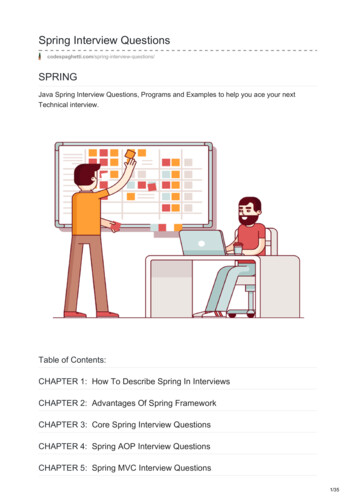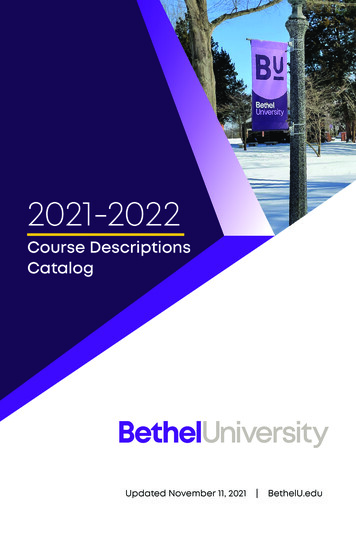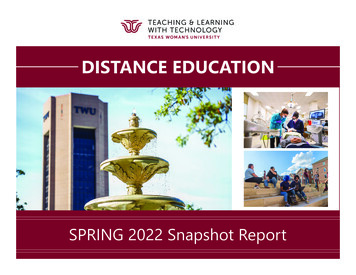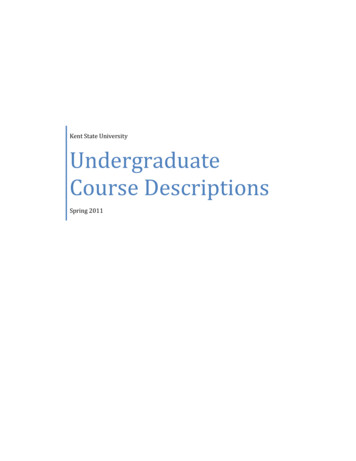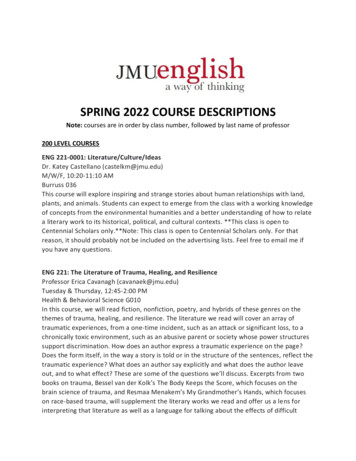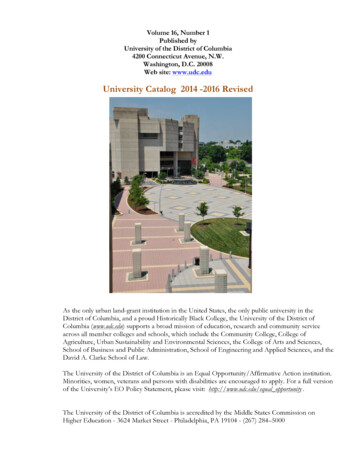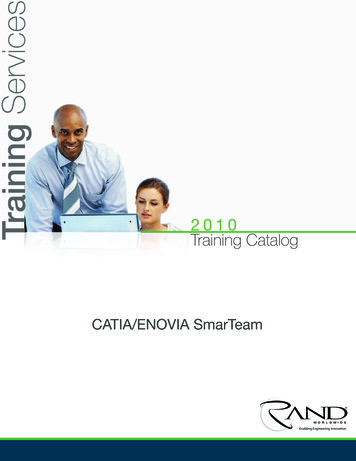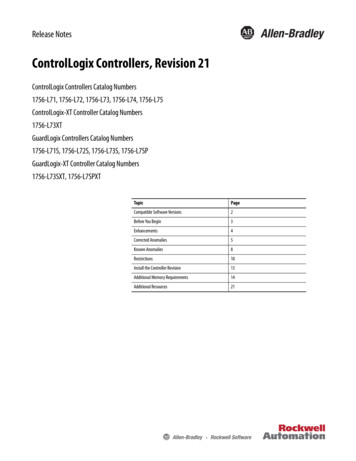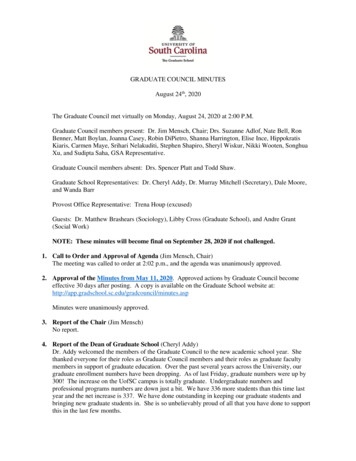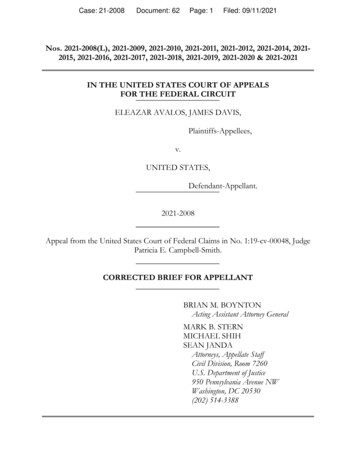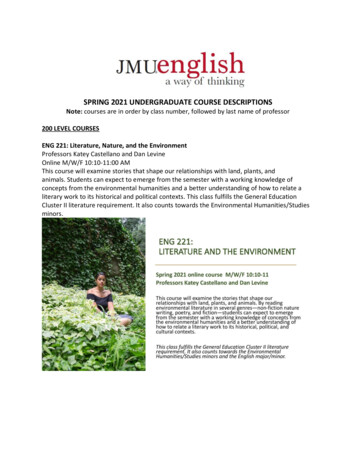
Transcription
SPRING 2021 UNDERGRADUATE COURSE DESCRIPTIONSNote: courses are in order by class number, followed by last name of professor200 LEVEL COURSESENG 221: Literature, Nature, and the EnvironmentProfessors Katey Castellano and Dan LevineOnline M/W/F 10:10-11:00 AMThis course will examine stories that shape our relationships with land, plants, andanimals. Students can expect to emerge from the semester with a working knowledge ofconcepts from the environmental humanities and a better understanding of how to relate aliterary work to its historical and political contexts. This class fulfills the General EducationCluster II literature requirement. It also counts towards the Environmental Humanities/Studiesminors.
ENG 221 (0001): Literature/Culture/Ideas: Latinx StorytellingDr. FaganOnline – M/W/F 9:15-10:05 AMCombination of synchronous and asynchronous work“So who can hearthe words we speakyou and I, like but unlike,and translate us to usside by side?”-Pat MoraIn this Honors course, we will compare and contrast the stories of contemporary U.S. Latinxwriters who trace their heritage to Mexico, Cuba, Puerto Rico, and Central and South America.In addition to considering how race, nation, and ethnicity shape our understandings ofLatina/o/x identity, we will also discuss the influencing forces of gender, sexuality, class, andlanguage on Latinx writers. Students can expect to read poetry, short fiction, and 1-2 novels.Coursework will include written essays, an annotation project, and a group presentation.
ENG 221: Sushi and Chicken Kung Pao with a Slice of Apple Pie: Introduction to AsianAmerican LiteratureDr. Debali Mookerjea-LeonardOnline – M/W 2:15-3:30 PMThe course is designed to introduce students to a variety of writings by Asian-American authors.It will explore the historical formation of Asian American identities, issues of immigration,citizenship, race, and about the aesthetic forms of representation explored by Asian Americanwriters and artists. While we will devote most of our time to literary texts, we will also directsome of our critical attention to the role of popular culture in the ongoing construction of Asianand Asian American identities.This course fulfills the General Education Cluster 2 Group 3 (Literature) requirement; the surveyor “Identity, Diversity, Power” requirement for the English major, it also counts towards therequirements for the World Literature minor, and the American Studies minor.ENG 221: Modernity and Appetite (World Literature) (Section 0005)Dr. Molly O'DonnellOnline – T/TH 9:40-10:55 AMThis course introduces students to global literary figures and movements (seventeenth century– present) through inquiry into “appetites.” Through this theme, we will consider both thepitfalls and triumphs of appetite in all its forms as presented in literature. In this coursestudents will think critically about these questions within larger contexts: What drives our actions? What passions help or hurt us? Is man innately subject to physical, emotional, or intellectual appetites? How do our appetites define/control us? How do we suppress them to conform, achieve,disguise, or shine? What are the consequences of sated desire or, alternately, want? Is the response to specific appetites individual or collective? How do our appetites impact others? Do our notions of the validity of appetite change over history and in different cultures?
ENG 221: Modernity and Appetite (World Literature) (Section 0006)Dr. Molly O'DonnellOnline – 11:20 AM-12:35 PMThis course introduces students to global literary figures and movements (seventeenth century– present) through inquiry into “appetites.” Through this theme, we will consider both thepitfalls and triumphs of appetite in all its forms as presented in literature. In this coursestudents will think critically about these questions within larger contexts: What drives our actions? What passions help or hurt us? Is man innately subject to physical, emotional, or intellectual appetites? How do our appetites define/control us? How do we suppress them to conform, achieve,disguise, or shine? What are the consequences of sated desire or, alternately, want? Is the response to specific appetites individual or collective? How do our appetites impact others? Do our notions of the validity of appetite change over history and in different cultures?ENG 221: American Psycho: Madness in American LiteratureProfessor Matthew RebhornOnline – M/W/F 2:15-3:05 PMFrom psychotic sleepwalking in the eighteenth century to violent self-loathing today, madnesshas always shadowed the development of American national identity, offering a darker, moreinsidious underside to what Ralph Waldo Emerson triumphantly called American “selfreliance.” This course explores this dynamic by focusing on the way American madness hasbeen represented in literature, from the novel to short story to film. Taking up early depictionsof madness in authors such as Edgar Allan Poe and Herman Melville, following the diversifyingrepresentations of madness in Henry James, Willa Cather, and Charles Chestnutt, and coming totalk about the inheritance of these “tropes of madness” in The Haunting of Hill House, FightClub, and Get Out, this course will offer students a brief history of American madness. Byclosely reading these texts, developing our writing skills, and learning to think about ideasacross multiple texts, this course will also help students both become better readers of texts,and, perhaps understand more fully why “we all go a little mad sometimes.”
ENG 221: Literature/Culture/IdeasProfessor Marco WilkinsonOnline – T/TH 4:20-5:35 PMCourse description to be added soonENG 221H: The Rebel and the Artist in Modern Irish LiteratureDr. Siân WhiteM/W/F 10.30-11.20 AMDuring the Easter Rising of 1916, as part of Ireland’s struggle for independence from Britishimperial rule, 36-year-old Pádraic Pearse stood outside of the General Post Office and read theProclamation of the Irish Republic. For this act of rebellion, Pearse was executed without trialalong with fifteen others. Pearse was in some ways a rebel; he was also a poet, teacher, andnative Irish speaker.The relationship between the rebel and the artist, the political and the artistic, dominates Irishliterary history, especially during the twentieth century. This course traces that evolvingrelationship from the period of independence, to the partition of the island into two nations –what are now the independent Republic of Ireland and Northern Ireland, still part of the UnitedKingdom – and through a period of continuing anti-colonial campaign in Northern Irelandknown as “the Troubles.” In novels, plays, short stories, and poems, we will focus not just onart – especially literature – as it represents national identity and nationalist politics, but also onartistic representation as a political act in itself.This is an Honors section of a General Education course. Students can expect informal andformal writing assignments, midterm and final exams, and individual presentations.
ENG 222: Genres (Speculative Fiction)Dr. Sharon CoteOnline – T/TH 4:20-5:35 PMIn this course we will focus on a humanistic examination of some major philosophical and socialthemes in speculative fiction. Also, while discussing a diverse collection of both relativelycontemporary and more historical speculative works, we will be led to consider the culturalfactors that influence ideas about genre, about literary "greatness," and about the problematicnotion of canonicity in the humanities. More generally, we'll challenge our own first responsesto readings and hone our ability to evaluate literature and its potential as a gateway to newideas and insights. We'll explore some connections between our central works and othercreative and/or intellectual works. Finally, through all these efforts, we'll work on improving ourbasic ability to approach ANY text (ie. not just "literature") and, in fact, any communicative actcritically, developing basic vocabulary and skills in the techniques of textual analysis.In this course we will focus on a humanistic examination of some major philosophical, social,and psychological themes in science fiction and other subgenres of speculative fiction. Also,while reading and discussing a diverse collection of both relatively contemporary and morehistorical works that can be categorized as "speculative," we will consider the cultural factorsthat influence ideas about genre, about literary "greatness," and about canonicity in thehumanities. More generally, we'll challenge our own first responses to readings and hone ourability to evaluate literature and its potential as a gateway to new ideas and insights. We'llexplore some connections between literary works and other creative works and intellectualpursuits. Finally, through these efforts, we'll work on improving our basic ability to approachANY text (ie. not just "literature") and, in fact, any communicative act critically, developing basicvocabulary and skills in the techniques of such analyses.ENG 222: Liking Poetry (section 0008)Dr. Annette FedericoOnline – M/W/F – 1:00-1:50 PMIn this introductory class, we will read and discuss a diverse array of lyric poetry in English. Wewill learn how to do a close reading of a poem, expand our knowledge of particular poets andpoems, try to comprehend the emotional landscape of a poem and our own emotions, and gainrespect and appreciation for the work poets do and what they give to the world.ENG 222: Liking Poetry (section 0009)Dr. Annette FedericoOnline – M/W/F – 2:15-3:05 PMIn this introductory class, we will read and discuss a diverse array of lyric poetry in English. Wewill learn how to do a close reading of a poem, expand our knowledge of particular poets and
poems, try to comprehend the emotional landscape of a poem and our own emotions, and gainrespect and appreciation for the work poets do and what they give to the world.ENG 222: Ideology and Global CinemasDr. Dennis LoOnline – M/W/F 11:45 AM-12:35 PMThis course introduces General Education students to the politics, aesthetics, and socialcontexts of global cinemas, with a focus on films that explore shifting ideologies and culturalidentities – class, gender, ethnicity, and race – in times of social tumult. Through weeklyscreenings, readings, and writing assignments, we will investigate how various genres of globalcinemas act as forces of ideological critique in response to issues of geopolitics, globalization,colonization, nation-building, modernization, underdevelopment, migration, and socialmarginalization. Our survey of six major periods and various styles of socially-conscious globalcinemas will span the continents of Asia, Europe, Africa, and the Americas. We will proceed in achronological order, moving from pre-war (Japanese, European), post-war (Italian, Indian), newwave (French, Japanese, Eastern European, American), and third cinemas (Latin American,African), to accented (Middle Eastern, Chinese) and transnational cinemas (global coproductions).Complementing the weekly screenings are readings that present close analysis of films andfilmmakers, as well as scholarship on the historical, aesthetic, philosophical, industrial, andpolitical contexts shaping these diverse cinematic traditions. Readings will also include textsfrom various disciplines – film studies, cultural studies, and media studies – that introduce basictechniques and theoretical approaches for critically examining the films’ underlying politicaland philosophical themes. Writing assignments such as film analysis papers will providestudents with opportunities to conduct more in-depth analysis of films, filmmakers, andindustries. Our goal is to arrive at a deepened understanding of the stylistic and narrativestrategies by which films shape representations of cultural identities, give voice to marginalizedsocial groups, and engage in social critique and activism.Course modality: online over Zoom and Canvas, with all classes meeting synchronously,assignments asynchronousEnglish 222: Introduction to PoetryDr. ParkerOnlineThis course provides an introduction to poetry by focusing on one particular kind of poem, thelyric. The goal is for you to be able to read and understand poetry, as well as to take pleasure init. We’ll talk, of course, about what particular poems mean, but our focus will often be on howthey mean. In doing this, we’ll consider poetic form and poetic conventions carefully.
There is a body of knowledge to learn in this course, but you will also develop specific skills. Bythe end of the semester, you should be familiar with many poems (those we’ve discussed inlecture and in section), and you should be able to speak about them accurately andintelligently. But you should also be able to make well-informed comments on new texts aswell.While the course presupposes no knowledge of poetry, it will require your close attention.Poems are sophisticated and often demanding art objects, and many of them will test yourskills of reading and thinking. Be prepared to work hard on them.The course will be delivered as a series of podcasts and a 50 minute, small group discussionsection on Zoom.ENG 222: Genre(s): Fairy TalesDr. Sofia SamatarOnline – T/TH 11:20 AM-12:35 PMEnglish 222 introduces students to literary genres. In this course, we will study fairy tales, oneof the world’s oldest and most widespread genres. Students will have the opportunity to readboth familiar and unfamiliar stories; practice comparative analysis; engage with a variety ofcritical perspectives on fairy tales; examine contemporary retellings; and revel in one of themost delightful and rewarding forms of storytelling.
ENG 222: Lyric PoetryProf. Greg WrennOnline – M/W 5:35-6:50 PMAnd remembering Remembering, with twinklings and twinges,As they lean over the beans in their rented back room that is full of beads andreceipts and dolls and clothes, tobacco crumbs, vases and fringes.—Gwendolyn Brooks, “The Bean Eaters”Taught by a published poet, this GenEd course is meant to introduce you to the pleasures ofreading and writing about lyric poetry, which focuses on emotion rather than telling a story.William Shakespeare, Gwendolyn Brooks, Sylvia Plath, Walt Whitman, Robert Frost—they’re alllyric poets, and we’ll be discussing their masterpieces, along with those by the likes of AdrienneRich, Yusef Komunyakaa, and Li-Young Lee, in order to learn the fundamentals of poetic craftand contend with some central poetic themes. At the heart of this course are the vital skills ofcritical thinking, close reading, and empathy, and we’ll be practicing them often in lecture andin writing assignments.
English 222H-1: Genre: The American Short StoryDr. GoodeKeezell 308 - T/TH 11:20 AM-12:35 PMThis course will focus on the American short story as it developed from the nineteenth centuryto the present. We will approach this diverse form of prose fiction from various angles,exploring formal elements, authorial styles, and literary periods. On our way through chartingthe development of the short story genre, we will use close readings to excavate how ourreading experience is shaped and guided by the creative choices of authors. This is not a “howto-write-a-short story” course, but rather the aim of the course is to show how good shortstories are works of deliberate craftsmanship. Authors to be read include Poe, Faulkner,Hurston, Carver, Baldwin, Oates, Alexie, O’Connor, LeGuin, and Machado.This course fulfills the General Education Cluster II-Literature requirement and a 200-levelcourse requirement for the English major.English 236: Survey of British Literature II: Romantics through ContemporaryDr. Heidi PenningtonEngineering/Geosciences 1302 - T/TH 11:20 AM-12:35 PMIn this overview of British literature from the last two hundred years or so, we’ll examine worksof poetry, prose, fiction, and drama. Paying careful attention to historical context, thematiccontent, and poetic and narrative form, we’ll attempt to generate a rudimentary understandingof what’s so “British” about this literature. In the process, we’ll trace shifting ideas aboutpersonal and national identities (including questions of gender, race, and class), authority andauthorship, and sociability through the literary creations of diverse writers. Mode: This coursewill consist primarily of online asynchronous readings, video lectures, quizzes, and writingassignments; there will be a once-weekly online synchronous discussion/Q&A session; severalsmaller-group in-person meetings are possible this semester, but not definite. Any changes tothis mode will be announced in a timely manner through Canvas to enrolled students.ENG 236H: Survey of English Literature: Eighteenth-Century to ModernDr. PriceOnline – T/TH 2:40-3:55 PM (online synchronous)This course introduces you to major authors and literary movements from the late eighteenthcentury on. Works will include Mary Shelley’s Frankenstein, Dickens’ A Christmas Carol, andStevenson’s Dr. Jekyll and Mr. Hyde. We will examine the historical contexts of suchmovements as romanticism and modernism, and move from broad discussions (of aesthetics,history, philosophy, etc.) to close readings of individual texts. Throughout the course we willwork on developing and applying the terminology of literary studies.In our class discussions we will consider how literary works both shape and reflect changingideas of childhood, gender, and empire. Of particular interest will be the character of the
doppelgänger or double, which appears repeatedly on the syllabus. Why do so many charactershave eerie doubles? What do those doubles tell us about the hopes and fears of the times inwhich they appear?ENG 239: Studies in World Literature: Children, Trauma, and World LiteratureDr. Debali Mookerjea-LeonardOnline – M/W/F 10:30-11:20 AMDescription: The Holocaust, the Partition of India, 9/11, and other civil and political conflictsaround the world as well as natural calamities have all claimed children as victims. Many havedied but thousands of children have suffered through these disasters and lived to tell theirtales. Examining memoirs and fictional accounts of children’s experience of war and violencethis course will address the issue of children’s trauma. Through a rigorous engagement with thetexts we will raise the following questions: How are children affected by the violence aroundthem? How do they cope with trauma? How do they remember the disasters thatovershadowed their lives? How are children’s experiences represented in literature? Why is thechild-narrator a popular literary device in writings on social and political conflicts?This course fulfills Gen.Ed. Cluster 2 Group 3 (Literature) requirement; the survey requirementor the “Identity, Diversity, Power” requirement for the English major; it also counts towards therequirements for the World Literature minor.ENG 239 (Section 0002): Studies in World Literature: Modern South AsiaDr. Debali Mookerjea-LeonardOnline – M/W/F 1:00-1:50 PMThis course introduces you to representative works of modern South Asian literature. It aims tocultivate an awareness of the historical, cultural, and intellectual contexts of writings fromSouth Asia through reading works both by Anglophone authors and writers from the region’svernacular traditions.Texts for the course have been selected from a range of genres—novel, short story, drama andpoetry. Films will be used to provide a visual complement to the texts. Through close readingand analyses of literary texts, and discussions in class, which will be organized around topicssuch as nation and narrative; home; migration; violence; gender; marginality; and identity, thecourse endeavors to refine your skills of critical thinking, reading and writing.This course fulfills Gen.Ed. Cluster 2 Group 3 (Literature) requirement; the survey requirementor the “Identity, Diversity, Power” requirement for the English major; it also counts towards therequirements for the World Literature minor.
ENG 239: Introduction to World LiteratureTopic: Fairy TalesDr. Sofia SamatarOnline – T/TH 1:00-2:15 PMEnglish 239 introduces students to key issues, concepts, and methods in the study of worldliterature. In this course, we will study fairy tales, one of the world’s oldest and mostwidespread genres. Students will have the opportunity to read both familiar and unfamiliarstories; practice comparative analysis; engage with a variety of critical perspectives on fairytales; examine contemporary retellings; and revel in one of the most delightful and rewardingforms of storytelling.ENG 247: American Literature to 1865Professor Matthew RebhornOnline – M/W/F 11:45 AM-12:45 PMThis course aims to explore the foundations of American Literature from its origins to, arguably,the most significant event in this country’s history—the American Civil War. Helping to guideour exploration of the diverse literary texts constituting “American Literature” during this timeperiod, we will be looking at the numerous formal, stylistic, and thematic ways in which all ofthese texts “contest,” or challenge, what it meant to be American. Exploring the rich texts ofthis course, therefore, from Puritan sermons to Enlightenment autobiographies, fromTranscendental essays to slave narratives, we will not discover the “real” American experiencebeneath this era. Rather, we will begin to see the ways in which these contests over themeaning of race, gender, history, class, and religion supplied the foundational energy thatdrove this country onto the national stage.ENG 248: Survey of American Literature IIDr. Brooks HefnerOnline – M/W/F 10:30-11:20 AMThis course is designed as an historical survey of American Literature since the Civil War. In thiscourse, you'll be introduced to many of the major writers, themes, and movements of the last150 years of American literature. From the horrors of fraternal strife, through the emergence oftechnological and economic modernity, to the destabilization of the post-war social fabric, ourtopics of discussion will intersect with U.S. history and other forms of cultural production (films,popular literature, music, etc.).
ENG 260 (section 0001): Survey of African American LiteratureProfessor Mollie GodfreyOnline - AsynchronousThis course introduces students to major authors, literary forms, and movements in AfricanAmerican literature. We study the emergence and flourishing of African American literatureover the past two centuries, noting common as well as diverging themes, techniques, andarguments over the coherence of African American literature as a genre. Throughout thesemester we will explore antebellum, Reconstruction, Harlem Renaissance, Civil Rights, BlackArts, and contemporary writers in their historical contexts as well as make connectionsbetween texts across historical periods.English 299: Writing about LiteratureDr. Heidi PenningtonKeezell 308 - T/TH 9:40-10:55 AMThis course introduces students to the English major by developing their familiarity with literarygenres, important theoretical concepts, and different approaches to literary analysis. With anemphasis on the processes of close reading, critical thinking, and revision, this course will honestudents’ skills in analysis, scholarly writing, research, and public speaking. All students will beexpected to contribute to in-class discussions. In a variety of ways, the literary texts we analyzein this class will explore the tensions among acts of creation, concepts of knowledge, and howwords and representation structure the realities around us. Mode: This course will consist oftwice-weekly online synchronous lecture-and-discussion sessions and online asynchronousreadings and assignments; several in-person discussion sessions are possible this semester,but not definite. Any changes to this mode will be announced in a timely manner throughCanvas to enrolled students.ENG 299: Writing About LiteratureProfessor David BabcockOnline – M/W/F 10:30-11:20 AMThis course introduces English majors to current methods of reading and interpreting poetry,drama, and fiction. Students will be invited to join several ongoing conversations within literarystudies, and tailor the ideas and concepts they find there to their own intellectual interests. Ouremphasis will be on developing the skills necessary to form convincing, thoughtful readings, andthen transform those readings into well-evidenced, argumentative essays.
ENG 299 (section 0003): Writing about LiteratureDr. Richard GaughranOnline – T/TH 11:20 AM-12:35 PMThe course is an introduction to the critical study of literature. It aims to foster skills andconcepts basic to literary analysis and interpretation. It seeks to enhance appreciation forliterary texts. It attempts to answer such basic questions as “What is Literature?” Can we callsome writing “good” and some inferior? On what basis? What preconceptions and evaluativeprinciples are we bringing to the discussion of literature?The course is writing-intensive, so there will be an emphasis on evaluating and discussingliterature in writing. The course attempts to instill in students basic standards for writing aboutliterature.
300 LEVEL COURSESENG 302: The Power of ResistanceDr. Melanie ShoffnerMemorial Hall 2110 - T/TH 1:00-2:15 PMIn this course, we will read a variety of texts that present stories of resistance by ‘everyday’people during times of war, civil unrest, and social change. Our readings will take us far – from18th-century Constantinople, Nazi-occupied Hungary, and apartheid South Africa to 20thcentury Dominican Republic, China’s Tiananmen Square, and assimilationist Australia – andreturn us home – to the streets of Milwaukee, the schools of Parkland, and the borders ofMexico. We will consider how authors articulate concepts of resistance and power, howcharacters engage us (or not) in their struggles, and why we dis/agree with certain forms ofresistance over others. **This course’s exploration of stories that develop understandings ofequity and justice is particularly suited for students in secondary education.**ENG 307 (section 0001): Literature, Culture, and Ideas: Bob Dylan in His TimesDr. Richard GaughranOnline – T/TH 9:40-10:55 AMBob Dylan, the 2016 recipient of the Nobel Prize in Literature, known mostly as a musical artist,has been in the public arena at least since 1962. This course examines his place in the broaderculture and the ways in which his artistic output has interacted with that culture. Early regardedas “the voice of his generation,” Dylan has continually endeavored to shed such labels in pursuitof original expression, mostly in music, but also in painting, film, and prose.The course will examine the major periods of Dylan’s career, beginning with the earlyengagement with important contemporary concerns: the Cold War, the threat of nucleardestruction, poverty, racism. The course will proceed chronologically, moving into Dylan’smature period from the mid-1960s to the mid-1970s, his Christian period, and toward the lateflowering at the turn of the century. We will examine lyrics, especially those allusive andelusive, but the course will also touch upon other artists in his circle, both influencers and theinfluenced.
ENG 310: Modern English GrammarDr. Sharon CoteOnline – T/TH 11:20 AM-12:35 PMIn this course, we will examine the structure of the English language from a modern, linguisticperspective. Students will discover what it means to be a native speaker of a language and willdevelop a conscious understanding of a wide range of particular unconscious grammaticalconcepts, principles, and rules that shape our everyday use of English. More generally, studentsshould come away from this course with a better awareness of what grammar rules are, ofwhere they come from, of how they can be determined, and of the extent to which they are orare not fixed and comprehensive.ENG 311: Courting Disaster: Medieval Romance and Its MalcontentsProfessor Amanda GerberOnline – T/TH 2:40-3:55 PMThe Middle Ages invented romance, making love and magic conventional. However, manymedieval romances still considered themselves extensions of ancient Roman histories and NearEastern conflicts, particularly their catastrophes and military exploits. This class examines theresulting language of love from the perspectives of its Roman and Arabic influences, itsmedieval inventions, and some of its modern reincarnations in romantic comedies. With thisframework, we will explore the vexed romantic tradition that modernity inherited from theMiddle Ages, including its prescribed protocols and gender roles, its reliance on political andsocial bonds, and its tendency to break all of these rules to flirt with disaster. In the end, we willanswer questions such as: Why do we continue to use medieval romance practices andstandards? And what can we learn about our own notions of romance by unearthing theirfrequently cataclysmic historical sources?ENG 318: Shakespeare's Comedies and HistoriesDr. Mark RankinWilson Hall 1010 - T/TH 11:20 AM-12:35 PMThis course offers a rigorous overview of the comedies and histories of WilliamShakespeare (1564-1616). Shakespeare is central to western culture, and one cannot beeducated without possessing some familiarity with his plays. However, Shakespeare’s centralityrests upon the playwright’s posthumous reputation as much, or more, than upon criticalengagement with the plays themselves. People sometimes feel that Shakespeare “speaks to us”and offers “insight” into “humanity,” without asking what these assumptions might mean. Howdid Shakespeare understand humanity, and where did he find his ideas? What books did heread, and what influenced his thinking? Does Shakespeare “speak to us” because we want himto, more than any other author? How did Shakespeare engage with the most debated ideas ofhis time? How and why did later readers fashion the plays into something pos
SPRING 2021 UNDERGRADUATE COURSE DESCRIPTIONS Note: courses are in order by class number, followed by last name of professor 200 LEVEL COURSES ENG 221: Literature, Nature, and the Environment Professors Katey Castellano and Dan Levine Online M/W/F 10:10-11:00 AM This course will examine stories that shape our relationships with land, plants, and
